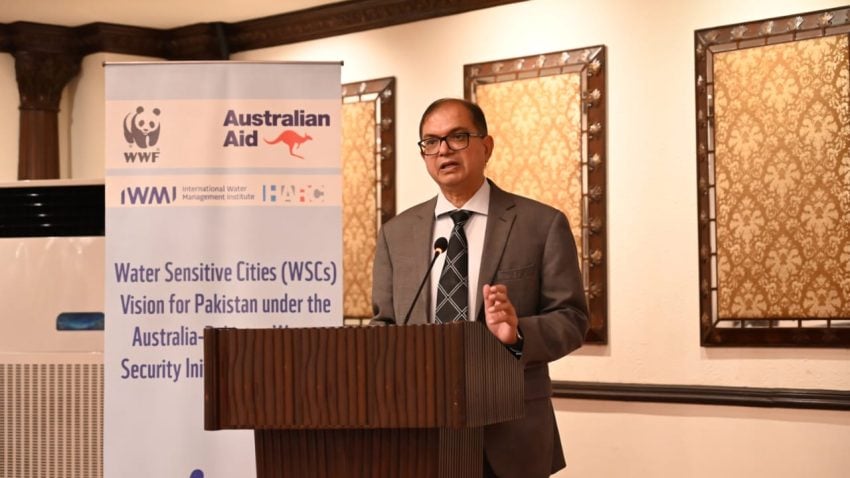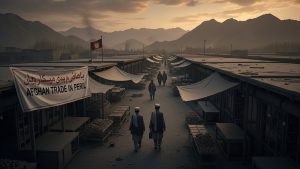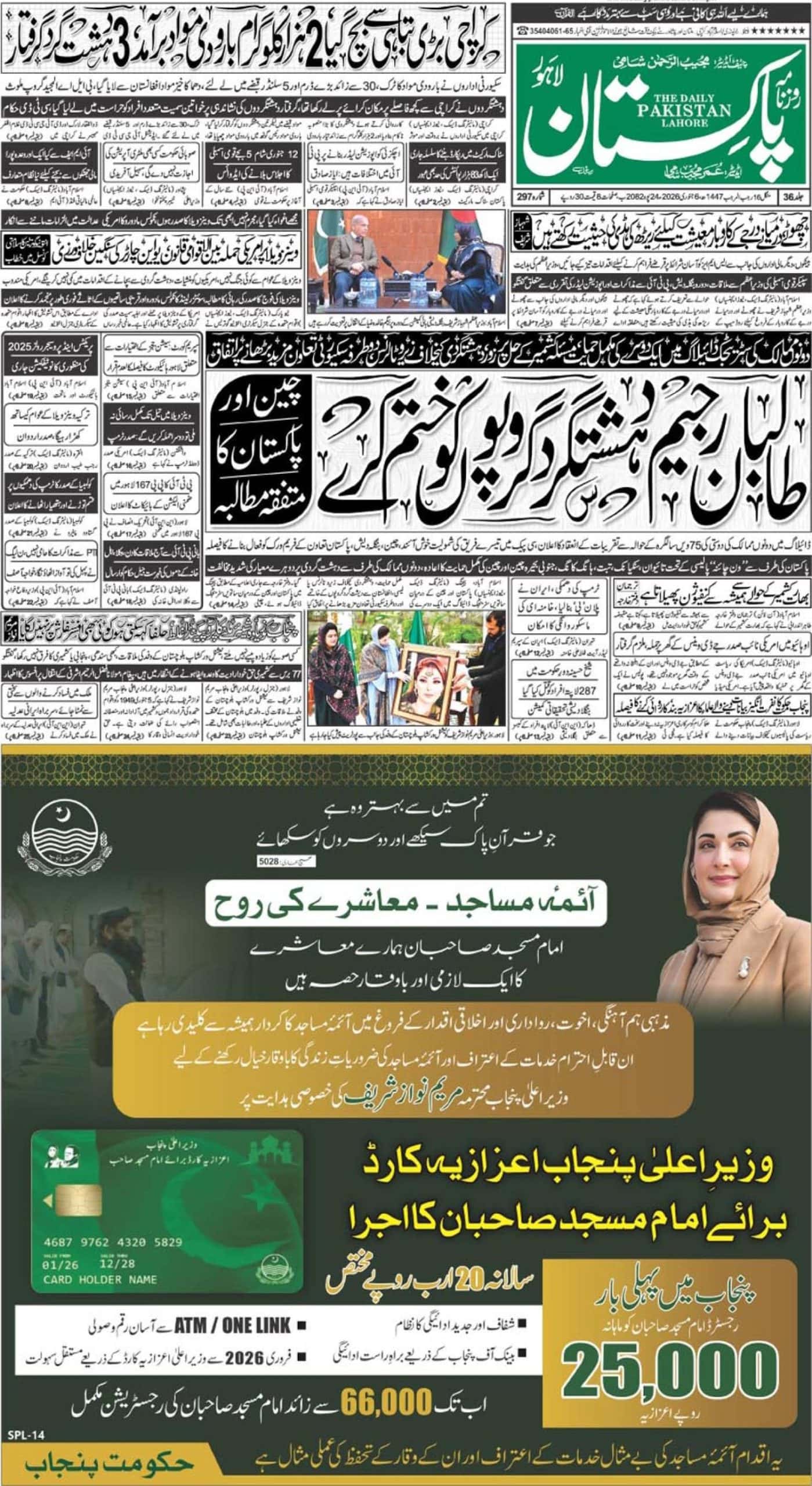This publication has been funded by the Australian Government through the Department of Foreign Affairs and Trade. The views expressed in this publication are the author’s alone and are not necessarily the views of the Australian Government. The Australian Government neither endorses the views in this publication nor vouches for the accuracy or completeness of the information contained within the publication.
Water is crucial for economic growth, urban development, and human well-being in any country. However, Pakistan faces significant challenges in water management, particularly in large metropolitan cities such as Islamabad, Rawalpindi, Lahore, and Karachi. Rapid urbanisation and increasing water demand have strained the water resources in these areas. The urban water sector in Pakistan faces numerous challenges, including policy misalignment, overlapping mandates, unsustainable urban planning, poor coordination, capacity constraints, and inadequate water resource assessment, all of which collectively contribute to inefficient urban water management.
The Water-Sensitive Cities (WSCs) framework advocates for cities that integrate water management with urban planning to achieve sustainability, focusing on water conservation, urban resilience, and environmental protection. Initially developed and implemented in Australia, this framework promotes best practices in urban water management, including decentralised solutions such as rainwater harvesting, managed aquifer recharge, green infrastructure, and community participation in water governance. By prioritising and integrating water into urban design and planning, the WSC approach enables cities to transition toward long-term sustainability and resilience.
Pakistan’s fragmented governance system leads to inefficiencies, as multiple institutions at the federal, provincial, and local levels have overlapping responsibilities. The lack of centralized water data and weak financial frameworks hinder effective decision-making. Urban expansion, particularly in Islamabad-Rawalpindi, is projected to grow from 1.7 million to 20 million by 2050, increasing pressure on already limited water supplies. A falling water table by 1.0 m/year in Islamabad is also a matter of grave concern, as it raises issues of deteriorating quality, in addition to ensuring long-term drinking water supplies.
Existing policies are mostly supply-driven and infrastructure-focused rather than demand-driven, neglecting the Integrated Water Resources Management (IWRM). The absence of IWRM, lack of a monitoring framework and poor revenue collection worsen the situation. Climate change, gender equity, and public engagement are often missing from most policies, thereby reducing their effectiveness. Water pollution, poor sanitation, and inefficient distribution networks exacerbate the crisis. Rapid industrialisation and the discharge of urban waste into rivers have led to significant contamination issues, impacting the entire ecosystem.
Groundwater depletion represents a critical concern in urban Pakistan, where excessive extraction has led to significant declines in groundwater levels. In cities such as Rawalpindi, the high concentration of tubewells has resulted in groundwater levels falling at a rate of 2.5 meters per year. To address this issue, the International Water Management Institute (IWMI) and the Pakistan Council of Research in Water Resources (PCRWR) have initiated recharge projects in Islamabad utilizing Managed Aquifer Recharge (MAR) and rainwater harvesting techniques to restore groundwater levels. Additionally, they have installed Conductivity, Temperature, Depth (CTD) divers at selected locations for real-time groundwater monitoring.
Under the Australia-Pakistan Water Security Initiative (APWASI), funded by the Department of Foreign Affairs and Trade (DFAT), Government of Australia, the World-Wide Fund for Nature (WWF) Pakistan has developed community-scale groundwater recharge sites in Farash and James Towns. The Capital Development Authority (CDA) subsequently expanded MAR projects, establishing 100 recharge sites across the city. Furthermore, building by-laws now mandate rooftop rainwater harvesting and groundwater recharge, integrating conservation into household water management practices. Nevertheless, the establishment of a comprehensive large-scale groundwater monitoring system remains essential to understand groundwater behaviors over time and space.
Policy Gaps and Implementation Barriers
A key finding of the critical review of Pakistan’s urban water policies is that policy gaps and poor implementation continue to be significant barriers to effective climate-smart water management. Key barriers are:
- Fragmented institutional roles, causing inefficiencies.
- Lack of technical capacity to implement policies effectively.
- Weak financial systems, poor revenue collection, and underfunded infrastructure.
- Minimal public engagement, limiting awareness and compliance.
- Neglecting the concept of climate-smart (ecofriendly) cities and outdated policies.
Additionally, gender, equity, and social inclusion (GESI) concerns are often ignored in water policy frameworks, making marginalized communities more vulnerable. A lack of a structured monitoring system prevents the tracking of progress and ensuring of accountability. Political interference and short-term planning further disrupt policy continuity, leading to incomplete projects and wasted resources.
Technology can enhance urban water governance. Under APWASI, funded by DFAT, IWMI uses a hydrological modeling tool in Islamabad to assess runoff potential, which helps optimize rainwater harvesting and flood control. Additionally, groundwater modeling estimates abstraction rates and recharge potential, informing sustainable policy decisions. Geotagging and licensing of tubewells can prevent over-extraction, while water metering at the household level, combined with conservation incentives, can improve demand-side management. Smart water grids, real-time data monitoring, and automated leakage detection systems can reduce water wastage and increase supply efficiency.
Public Engagement and Awareness
Public participation is vital for water conservation within the WSC framework. Groundwater recharge projects in Islamabad highlight effective local solutions. Initiatives by APWASI, IWMI, WWF, and government stakeholders educate citizens on sustainable water use through campaigns, workshops, and media outreach. Public-private partnerships with NGOs and development agencies enhance these efforts. School-based programs can instill conservation values early, helping bridge awareness gaps and fostering long-term behavioral change. Integrating water conservation into primary and secondary curriculums will cultivate a water-conscious generation and support sustainable conservation.
Way Forward: Strengthening Water Governance
To develop Water-Sensitive Cities, Pakistan must adopt integrated water governance reforms. Key recommendations include:
- Institutional Restructuring – Define roles and responsibilities, improve inter-agency coordination, and create an Integrated Water Governance Framework.
- Policy and Legal Reforms – Enact a Water Act for Islamabad Capital Territory (ICT) to regulate groundwater use and enforce conservation laws.
- Capacity Building – Train government officials in modern water resource management.
- Scaling Up Groundwater Recharge – Expand Managed Aquifer Recharge (MAR) models in major cities.
- Stormwater and Nature-Based Solutions – Implement green infrastructure, such as wetlands, MAR and permeable pavements, to improve resilience.
- Water Efficiency Incentives – Provide conservation incentives for households and industries.
- Community Engagement and Awareness – Promote water conservation education through targeted public campaigns.
- Climate Adaptation Strategies – Update water policies to address the effects of climate change and future water scarcity risks.
Pakistan’s escalating water crisis demands urgent action. Rapid urbanization and increasing water demand make sustainable development and localized water resource management crucial. Initiatives like APWASI and interventions by IWMI in Islamabad support informed policy implementation and effective urban water management. WWF’s rainwater harvesting projects demonstrate practical, scalable solutions for water conservation and groundwater recharge within the Water Sensitive Cities (WSC) framework.
To secure a sustainable water future, Pakistan must address governance gaps, adopt innovative technologies, and involve communities in decision-making. Political commitment, financial investment, and institutional reforms are essential to turning policies into practice. A proactive approach will ensure sustainability, resilience, and a better quality of life for future generations.
Umar Waqas Liaqat, Naveed Iqbal, Sarfraz Munir and Iqra Akram also contributed to this article.














